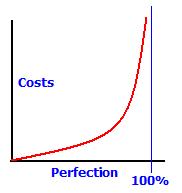“Price has no meaning without a measure of the quality being purchased.”
~W. Edwards Deming
It always fascinated me how price was the main axis of the game of closing software development deals. Unfortunately, in the vast majority of cases, pricing is used in total isolation from any other criteria, especially quality.
It was like this when I worked on off-the-shelf ERP software. In this case it was, to some point, understandable. You can’t universally define functionality-to-price and quality-to-price factors if you sell the same product to thousands customers. It will be different in many cases.
In such a case the question is what you deliver for the price you put on the tag attached to your product. Is it of high quality? And more importantly: do you keep, or even improve, the quality consistently?
As a matter of fact, we didn’t. We didn’t think in such terms. It was more of a chase for more functionality to satisfy new customers than a conscious effort to keep the quality of software stable. You may guess how that affected the quality. Let me just say I’m not proud of the end result.
It was still much better than what I experienced later, which was building custom projects for big clients. As a leader of software development and project management divisions I was often involved in the sales process. I was always asked how much time and people we need to build a thing. I was often asked about features the thing had or was going to have. I was never, ever, asked about the quality of the product or the tools we’d had in place to ensure this quality. Ever. Not a single time.
It isn’t an industry-specific observation. I went through a few industries, including banking, insurance and telecommunications, and it was always the same.
I’m compassionate for these poor chaps that were the decision makers. They followed their fears represented by the “nobody ever got fired for buying IBM” attitude. They just played it safe. In fact, I blame the system.
I blame the system that disconnects the price from the quality of purchased goods or services. In such a case price is almost meaningless, yet it is almost always used as a deciding factor.
The question I often wanted to ask the decision makers was: if they were buying the product with their own money would they be choosing the same? Obviously not. In fact, when we refer to our everyday lives, which I like doing, we never forget the relationship between quality and price.
When I buy sticky notes to use on whiteboards I choose 3M even though they are pretty expensive when compared to alternatives. Actually, given a choice, I take 3M Super Stickies, which are even more expensive. It’s just the quality I need and I’m willing to pay for.
When you think about the slow food movement being more and more popular over the course of the past 20 years, it follows the same pattern. Most of the premium products exploit the same behavior. Heck, how many of you, my dear readers, bought one of those overpriced smartphones or tablets? Apple fans, anyone? What is it if not paying for quality? And how do you choose a new car I wonder? By price tag only?
So why, the hell, do you become Mr. Hydes when you return to your workplace and you choose a vendor? Oh, the system, I forgot.
The system is, in fact, bigger than just an organization choosing a vendor. It spreads across most, if not all, of the vendors, too. A good picture of this would be a story my friend told me about the tender process in Romania in which he was involved as a representative of one of the bidders.
When all the offers were formally submitted, the client organized a meeting with all the potential vendors, announced what the lowest bid was and asked everyone to reconsider their offers giving them half an hour to resubmit proposals with new pricing.
When they had all the discounted bids re-submitted they did it again.
It’s just spreading a sick behavior throughout the whole ecosystem. Optimizing solely for price means cutting corners on quality. Heavy price optimizations mean painful quality tradeoffs.
And we know that low quality means a lot of rework and, as a result, higher overall cost.
Now, that I’ve changed jobs, I’m more directly involved in the sales process. And I couldn’t be happier to learn that we don’t take part in this game. We are (relatively) expensive. Don’t expect the lowest bid from us. We understand what it takes to build high quality software and are ready to walk away if someone expects us to drive the price down to the point when we compromise the quality.
Because, at the end of the day, low price is costly for both: a client and a vendor.
You just can’t consider price in isolation from quality.



